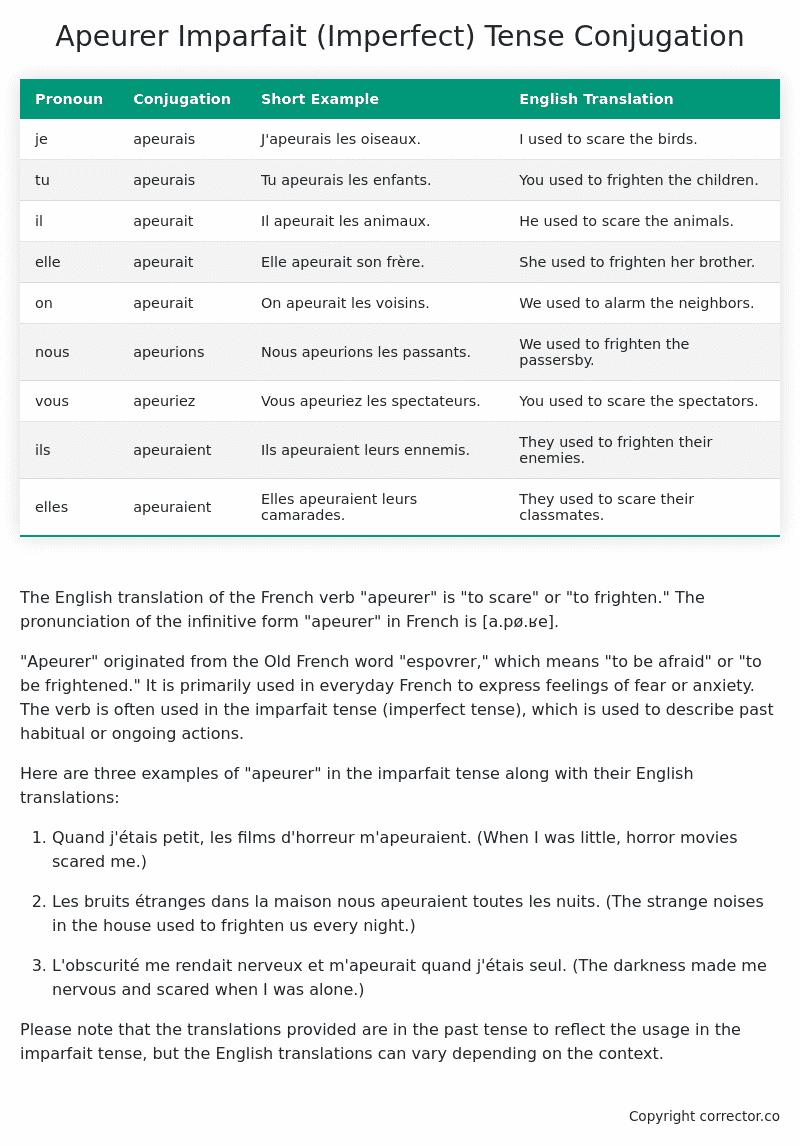Imparfait (Imperfect) Tense Conjugation of the French Verb apeurer
Introduction to the verb apeurer
The English translation of the French verb “apeurer” is “to scare” or “to frighten.” The pronunciation of the infinitive form “apeurer” in French is [a.pø.ʁe].
“Apeurer” originated from the Old French word “espovrer,” which means “to be afraid” or “to be frightened.” It is primarily used in everyday French to express feelings of fear or anxiety. The verb is often used in the imparfait tense (imperfect tense), which is used to describe past habitual or ongoing actions.
Here are three examples of “apeurer” in the imparfait tense along with their English translations:
-
Quand j’étais petit, les films d’horreur m’apeuraient.
(When I was little, horror movies scared me.) -
Les bruits étranges dans la maison nous apeuraient toutes les nuits.
(The strange noises in the house used to frighten us every night.) -
L’obscurité me rendait nerveux et m’apeurait quand j’étais seul.
(The darkness made me nervous and scared when I was alone.)
Please note that the translations provided are in the past tense to reflect the usage in the imparfait tense, but the English translations can vary depending on the context.
Table of the Imparfait (Imperfect) Tense Conjugation of apeurer
| Pronoun | Conjugation | Short Example | English Translation |
|---|---|---|---|
| je | apeurais | J’apeurais les oiseaux. | I used to scare the birds. |
| tu | apeurais | Tu apeurais les enfants. | You used to frighten the children. |
| il | apeurait | Il apeurait les animaux. | He used to scare the animals. |
| elle | apeurait | Elle apeurait son frère. | She used to frighten her brother. |
| on | apeurait | On apeurait les voisins. | We used to alarm the neighbors. |
| nous | apeurions | Nous apeurions les passants. | We used to frighten the passersby. |
| vous | apeuriez | Vous apeuriez les spectateurs. | You used to scare the spectators. |
| ils | apeuraient | Ils apeuraient leurs ennemis. | They used to frighten their enemies. |
| elles | apeuraient | Elles apeuraient leurs camarades. | They used to scare their classmates. |
Other Conjugations for Apeurer.
Le Present (Present Tense) Conjugation of the French Verb apeurer
Imparfait (Imperfect) Tense Conjugation of the French Verb apeurer (You’re reading it right now!)
Passé Simple (Simple Past) Tense Conjugation of the French Verb apeurer
Passé Composé (Present Perfect) Tense Conjugation of the French Verb apeurer
Futur Simple (Simple Future) Tense Conjugation of the French Verb apeurer
Futur Proche (Near Future) Tense Conjugation of the French Verb apeurer
Plus-que-parfait (Pluperfect) Tense Conjugation of the French Verb apeurer
Passé Antérieur (Past Anterior) Tense Conjugation of the French Verb apeurer
Futur Antérieur (Future Anterior) Tense Conjugation of the French Verb apeurer
Subjonctif Présent (Subjunctive Present) Tense Conjugation of the French Verb apeurer
Subjonctif Passé (Subjunctive Past) Tense Conjugation of the French Verb apeurer
Subjonctif Imparfait (Subjunctive Imperfect) Tense Conjugation of the French Verb apeurer
Subjonctif Plus-que-parfait (Subjunctive Pluperfect) Tense Conjugation of the French Verb apeurer
Conditionnel Présent (Conditional Present) Tense Conjugation of the French Verb apeurer
Conditionnel Passé (Conditional Past) Tense Conjugation of the French Verb apeurer
Conditionnel Passé II (Conditional Past II) Tense Conjugation of the French Verb apeurer
L’impératif Présent (Imperative Present) Tense Conjugation of the French Verb apeurer
L’impératif Passé (Imperative Past) Tense Conjugation of the French Verb apeurer
L’infinitif Présent (Infinitive Present) Tense Conjugation of the French Verb apeurer
L’infinitif Passé (Infinitive Past) Tense Conjugation of the French Verb apeurer
Le Participe Présent (Present Participle) Tense Conjugation of the French Verb apeurer
Le Participe Passé (Past Participle) Tense Conjugation of the French Verb apeurer
Struggling with French verbs or the language in general? Why not use our free French Grammar Checker – no registration required!
Get a FREE Download Study Sheet of this Conjugation 🔥
Simply right click the image below, click “save image” and get your free reference for the apeurer imparfait tense conjugation!

Apeurer – About the French Imparfait Tense
NOTE: To take a deep dive into all the French tenses then see our article on Mastering French Tense Conjugation.
Formation of the Imparfait Tense
For regular -er verbs:
For regular -ir verbs
For regular -re verbs
Common Everyday Usage Patterns
Description of Past Habits
Background Information
Mental and Emotional States
It’s employed to express emotions, thoughts, or physical sensations in the past. For example: “J’étais content quand il est arrivé.” (I was happy when he arrived.)
Ongoing Actions
Points to Note About the Imparfait Tense
Passé Composé vs. Imparfait
Conditional
Si Clauses
Narration
I hope you enjoyed this article on the verb apeurer. Still in a learning mood? Check out another TOTALLY random French verb imparfait conjugation!


